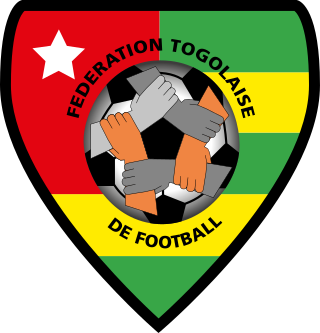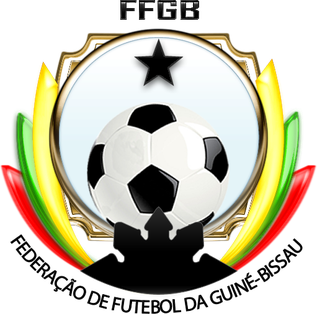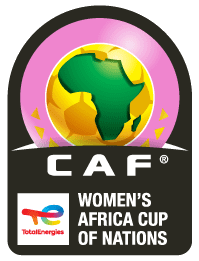Related Research Articles

The Tunisia national football team represents Tunisia in men's international association football competitions and it is controlled by the Tunisian Football Federation (TFF), which governs football in Tunisia. On the continental level, the team competes under the Confederation of African Football (CAF), which governs associate football in Africa, and is also affiliated with FIFA for global competitions. Additionally, the team is a member of the Union of North African Football (UNAF) and the Union of Arab Football Associations (UAFA). The team is colloquially known as Eagles of Carthage by fans and the media, with the bald eagle serving as its symbol. Their home kit is primarily white and their away kit is red, which is a reference to the national flag of the country. The team has qualified for the FIFA World Cup six times, qualified for the Africa Cup of Nations twenty-one times, competed in four editions of Summer Olympics and one participation in the FIFA Confederation Cup. Tunisia's main venue is the Hammadi Agrebi Stadium in Radès, Tunis since 2001. Kais Yaâkoubi, is the team’s interim head coach, since 5 November 2024. Tunisia played their first match after their independace against Libya and they won 4–2.

The Guinea national football team represents Guinea in men's international football and it is controlled by the Guinean Football Federation. They have never qualified for the FIFA World Cup finals, and their best finish in the Africa Cup of Nations was runners-up in 1976. The team reached the quarter-finals in four recent tournaments. The team represents both FIFA and Confederation of African Football (CAF).

The Togo national football team represents Togo in international football and is controlled by the Togolese Football Federation. The national football team of Togo made their debut in the FIFA World Cup in 2006. Their team bus underwent a fatal attack in Angola prior to the 2010 Africa Cup of Nations. They withdrew and were subsequently banned from the following two tournaments by the Confederation of African Football (CAF). In 2013 for the first time in history, Togo reached the quarter-finals of the Africa Cup of Nations. The team represents both FIFA and the Confederation of African Football (CAF).

The Libya national football team represents Libya in men's international association football and it is controlled by the Libyan Football Federation. The team has never qualified for FIFA World Cup but has qualified for editions of the Africa Cup of Nations in 1982, 2006, and 2012. In 1982, the team was both the host and runner-up. In the Arab Cup, Libya finished second in 1964 and 2012, and third in 1966. The team is affiliated with both FIFA and Confederation of African Football (CAF).

The Cape Verde national football team represents Cape Verde in men's international football, and is controlled by the Cape Verdean Football Federation. The team has never qualified for the FIFA World Cup, but has qualified for four Africa Cup of Nations tournaments, in 2013, 2015, 2021 and 2023. The team achieved their best result in 2023 after making it past the first round of the knockout stage.

The Mauritania national football team, nicknamed Al-Murabitun in the reference to Almoravid dynasty, represents Mauritania in men's international football. It is controlled by the Féderation de Football de la République Islamique de Mauritanie, and is a member of the Confederation of African Football. They have not qualified for the FIFA World Cup. However, in the Amílcar Cabral Cup, a regional tournament for West Africa, Mauritania came fourth in 1980 on hosting the competition. The national football team of Mauritania later runners-up in 1995, losing on penalties to Sierra Leone after the final finished 0–0.

The Central African Republic national football team, nicknamed Les Fauves, is the national team of the Central African Republic and is controlled by the Central African Football Federation. They are a member of CAF. Despite being traditionally one of the weakest teams in Africa and the world, they recently achieved success. They won the 2009 CEMAC Cup by beating Gabon in the semi-finals and Equatorial Guinea in the final 3–0. Their FIFA ranking rose from 202nd in August 2010 to 89th by July 2011. On 10 October 2010, they earned a shock 2012 Africa Cup of Nations qualifier win at home against Algeria 2–0, which put them top of their qualification group. The team won its first FIFA World Cup qualifier on 2 June 2012 after beating Botswana 2–0 at home.

The Guinea-Bissau national football team represents Guinea-Bissau in men's international association football and it is controlled by the Football Federation of Guinea-Bissau, The team has never qualified for the FIFA World Cups but qualified for the Africa Cup of Nations four times, making their debut in 2017. The team is a member of both FIFA and Confederation of African Football (CAF).
The Equatorial Guinea national football team represents Equatorial Guinea in men's international football and is controlled by the Equatoguinean Football Federation, a member of the Confederation of African Football (CAF).

Pierre Achille Webó Kouamo is a Cameroonian football manager and former professional player who played as a striker. He is the assistant manager of Turkish club İstanbul Başakşehir.

Achille Emaná Edzimbi, known as Emaná, is a Cameroonian former professional footballer who played as an attacking midfielder.

The 2010 Africa Cup of Nations, also known as the Orange Africa Cup of Nations for sponsorship reasons, was the 27th Africa Cup of Nations, the biennial football championship of Africa (CAF). It was held in Angola, where it began on 10 January 2010 and concluded on 31 January.

The Cameroon national women's football team, also known as the Indomitable Lionesses, is the national team of Cameroon and is controlled by the Cameroon Football Association. They finished second in the 1991, 2004, 2014, and 2016 Africa Women Cup of Nations, participated in the 2012 Olympic Games and have competed in their first ever FIFA Women's World Cup in 2015.
The Equatorial Guinea women's national football team, nicknamed the Nzalang Femenino, has represented Equatorial Guinea in senior international women's football competition since 2000. It is controlled by the Equatoguinean Football Federation, the governing body for football in Equatorial Guinea.

The Tunisia national women's football team, nicknamed The Eagles of Carthage, is the national team of Tunisia and is controlled by the Tunisian Football Federation. The team competes in the Africa Women Cup of Nations, UNAF Women's Tournament, Arab Women's Championship and the Women's World Cup, which is held every four years.
José Bokung Alogo, also known as Colin, is an Equatoguinean footballer who plays as a defender for local club Deportivo Unidad. He was a member of the Equatorial Guinea national team.
Narcisse Ekanga Amia is a former professional footballer who played as a midfielder. Born in Cameroon, he made eight appearances for the Equatorial Guinea national team.

The Women's Africa Cup of Nations (WAFCON), known for sponsorship purposes as the TotalEnergies Women's Africa Cup of Nations and formerly the African Women's Championship, is a biennial international women's football tournament organized by the Confederation of African Football (CAF) since 1998 as the qualification for the FIFA Women's World Cup for African nations. Initially started as a home-and-away qualification competition, it got rechristened as a biennial tournament in 1998 and took on its current name as of the 2016 edition.

This article provides details of international football games played by the Tunisia national football team from 2000 to 2019.
This article provides details of international football games played by the Senegal national football team from 2010 to 2019.
References
- 1 2 3 Etonge, Martin. "Seychelles 2001: Dim Hopes For Cameroon For Under-17 Title". Archived from the original on 3 March 2001. Retrieved 11 February 2018.
- ↑ "メリディアンカップ2001" (in Japanese). Archived from the original on 26 July 2008. Retrieved 26 December 2010.
- ↑ Archived 23 June 2012 at the Wayback Machine
- ↑ "FIFA.com - 2010 Fifa World Cup South Africa". Archived from the original on 26 August 2011. Retrieved 26 December 2010.
- ↑ Archived 25 June 2012 at the Wayback Machine
- ↑ Archived 2 May 2009 at the Wayback Machine (in French)
- ↑ (in Estonian)
- ↑ [ permanent dead link ](in French)
- ↑ "Exclusivo: La alineación ecuatoguineana vs. Botswana - Nzalang Mundial" (in Spanish). Archived from the original on 16 July 2011. Retrieved 26 December 2010.
- ↑ (in French)
